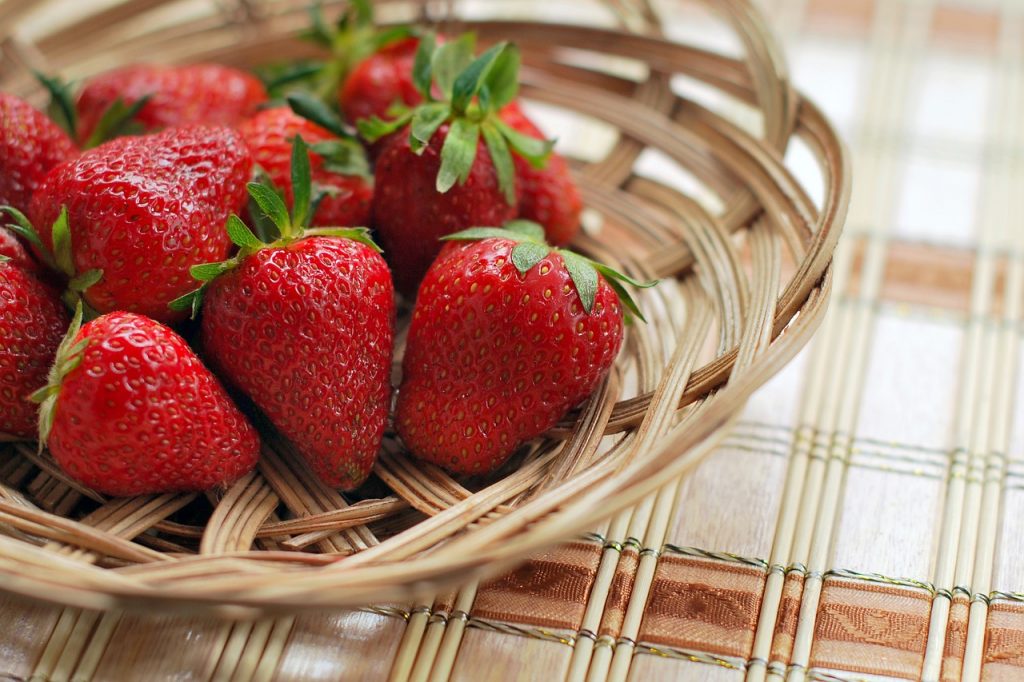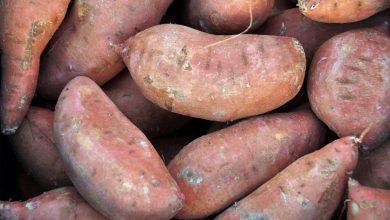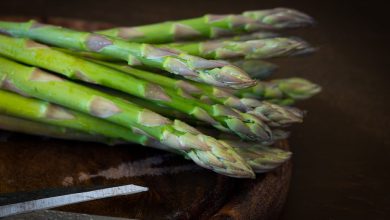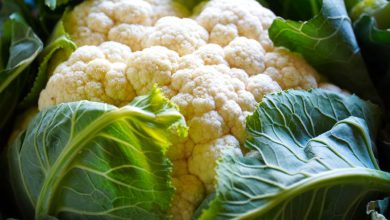Can Bearded Dragons Eat Strawberries?

Strawberries are always a popular fruit when they’re in season, so understandably many bearded dragon owners want to know whether bearded dragons can eat them.
Bearded dragons can eat strawberries as part of a balanced diet.
Due to the high sugar content of strawberries – the very thing that makes them so sweet – they should only be fed to bearded dragons in moderation. Given occasionally, however, strawberries make a wonderful treat for your lizard.
For best results, carefully wash the strawberries to ensure they are chemical-free before feeding. Then chop the strawberries into small pieces to make it easy for your bearded dragon to swallow them.
Lastly, be sure to remove any uneaten strawberries from your bearded dragon vivarium before they spoil. Realistically in the warm confines of a reptile cage this likely means including them in your bearded dragon’s morning meal, then removing them in the evening when you get home.
Can Bearded Dragons Eat the Tops of Strawberries?
The green leafy tops of strawberries can be eaten by bearded dragons.
However it is best not to feed the stalk or stem which pokes out of the top of the fruit as they are indigestible and can represent a choking threat to your pet.

Can Bearded Dragons Eat Strawberries with the Skin on?
Yes, bearded dragons can eat strawberries with the skin on.
The skin contains lots of vitamins and minerals, so it is a good idea to eat these as well.
Can Bearded Dragons Eat Strawberries Everyday?
Given the chance, most bearded dragons will happily eat strawberries every day. However just because they will doesn’t mean they should.
The reality is that strawberries are very high in sugar. As in humans, this can pose a potential health risk.
It is best not to feed strawberries to your bearded dragon everyday. Instead, if fed to your bearded dragon at all, they should be considered an occasional treat.
There is no need to feed strawberries at all if you are concerned about the sugar content. Indeed, while they taste very nice, there are arguably far better foods that should be making up the basis of your beardie’s diet.
How Often to Feed Strawberries To a Bearded Dragon
Strawberries should be fed to your bearded dragon only once or twice a week at most.
However the exact answer can depend on a range of factors.
Strawberries are high in sugar and contain little in the way of protein. It is important when feeding any fruit to bearded dragons that they are considered a treat. The majority of your bearded dragon’s food should consist of low-sugar foods, with “treat” foods like strawberries only making the odd appearance.
Young bearded dragons require high protein levels in their diet, and as a result normally receive a far higher proportion of feeder insects than do adults. So not only is their appetite smaller, but they eat less plant material overall. It’s crucial that every mouthful really counts in juvenile beardies.
So while adult bearded dragons may enjoy a bit of strawberry a couple of times a week, youngsters should eat them far less regularly.
What is the Calcium:Phosphorus Ratio in Strawberries?
The calcium to phosphorus ratio is an important consideration for bearded dragon keepers. Controlling this ratio can help to ensure a strong, healthy skeleton. Just as importantly it guards against the risk of metabolic bone disease (MBD).
The calcium:phosphorus ratio in strawberries is about 1:1.
It is important to note that this ratio can vary quite significantly between fruits, depending on their growing conditions.
It is generally agreed the “best” calcium to phosphorus ratio for bearded dragons is 2:1. That is – twice the amount of calcium as there is phosphorus.
While the calcium to phosphorus ratio in strawberries is not ideal, it is far from the worst ratio seen in some common bearded dragon foods.
It is important that strawberries should only make up a tiny proportion of your beardie’s diet. The rest should comprise foods with a better calcium:phosphorus ratio. This should help to avoid any potential problems with calcium in the diet.
You may also want to consider adding a powder supplement to your beardie’s diet to reduce the chances of mineral deficiencies. These are cheap to buy and easy to add to your bearded dragon’s meals under the instructions of the manufacturer.
Sale


Fluker’s Calcium Powder for Reptiles – Premium Reptile Calcium Powder with Added Vitamin D3, for Strong Healthy Bones and Vital Functions – Ideal for Lizards, Snakes, Turtles, Frogs – Made in USA – 4oz
- Premium Calcium Powder: Top-tier bearded dragon calcium powder, specially formulated for lizards, snakes, turtles and frogs. It ensures strong, healthy bones and vital bodily functions.
- Essential Reptile Accessories: Part of the essential reptile accessories needed for the optimal health of your reptile. It offers a proper balance of essential nutrients at any stage of life.
- Repti Calcium with added D3: Fluker’s is not just repti calcium, but a calcium supplement for reptiles with added Vitamin D3, perfect for indoor reptiles such as leopard gecko calcium requirements.
Nutrients Found in Strawberries
While we have discussed that strawberries have a relatively poor calcium:phosphorus ratio, there are lots of reasons why you might want to feed strawberries to your bearded dragon.
Like many fruits, strawberries are absolutely packed with all sorts of nutrients. Here are some of the most important benefits for your bearded dragon:
Firstly strawberries are low in oxolates. These are natural compounds found within many plants.
Unfortunately they’re known to impact the absorption of calcium. They can also lead to the formation of kidney stones. At best these are painful for bearded dragons.
In extreme situations they may even prove fatal. Foods that are low in oxalates, such as strawberries, therefore make a welcome addition to your beardie’s diet.
Strawberries are also low in sodium (“salt”) and fat.
On the flipside, there are a number of nutrients found in surprisingly high volumes in strawberries. These include vitamin A. vitamin B6, vitamin C and vitamin K. Strawberries also contain appreciable amounts of fiber and are packed with beneficial antioxidants.
Reasons Not to Feed Strawberries to Your Beardie
All told, things look quite rosy when it comes to feeding strawberries to bearded dragons. However there are a few things you should consider before giving them to your pet.
High Sugar Content – By definition strawberries are deliciously sweet, which is why bearded dragons, just like humans, love to eat them. At the same time we know that too much sugar is a bad thing. It can cause unhealthy weight gain, and even obesity if exercise is minimal.
Suboptimal Calcium:Phosphorus Ratio – If your bearded dragon eats too many strawberries then you may find that it isn’t consuming enough calcium. This can lead to skeletal problems over the long term.
Both of these elements mean that strawberries should only be considered an occasional treat for your bearded dragon. They certainly should not be fed daily as a staple of their diet.
Instead, the base of their diet should consist of dragon-safe green vegetables. Furthermore, try to offer as much variety as possible to guard against the risk of vitamin or mineral deficiencies.
How to Feed Strawberries To Your Bearded Dragon
Strawberries are very tasty for bearded dragons, but they are very sweet. As a result, be sure to feed them in moderation.
No special preparation is generally required when feeding strawberries to your bearded dragon, though the following tips may prove useful:
Wash Before Feeding – Shop-bought strawberries have often been sprayed with fertilizers and pesticides. It’s safest to give the outside of the fruit a thorough wash under running water to remove these.
Consider Chopping – A ripe strawberry is normally a pretty easy meal for a bearded dragon. They normally have no problems taking a bite out of the fruits. However chopping up the strawberries might make sense. It reduces the chances of choking, and also makes “selective feeding” less of an issue.
Combine With Other Foods – Due to their high sugar content, strawberries should be fed alongside other plant-based food. This “salad” will therefore contain a far wider range of nutrients than feeding strawberries alone.
Consider a Calcium Supplement – Depending on what other foods you’re including with the strawberries you may want to dust it with a mineral supplement. These are a cheap and easy way to ensure your bearded dragon is getting all the calcium they need.
Sale


Fluker’s Calcium Powder for Reptiles – Premium Reptile Calcium Powder with Added Vitamin D3, for Strong Healthy Bones and Vital Functions – Ideal for Lizards, Snakes, Turtles, Frogs – Made in USA – 4oz
- Premium Calcium Powder: Top-tier bearded dragon calcium powder, specially formulated for lizards, snakes, turtles and frogs. It ensures strong, healthy bones and vital bodily functions.
- Essential Reptile Accessories: Part of the essential reptile accessories needed for the optimal health of your reptile. It offers a proper balance of essential nutrients at any stage of life.
- Repti Calcium with added D3: Fluker’s is not just repti calcium, but a calcium supplement for reptiles with added Vitamin D3, perfect for indoor reptiles such as leopard gecko calcium requirements.
Use a Food Bowl – Ripe strawberries are juicy and can quickly make a mess of a bearded dragon vivarium. It is normally easiest to feed strawberries in a bowl, as it prevents juice getting onto the substrate. Placing the bowl onto a flat rock serves a similar purpose.
Bonus: Bearded dragons will also eat frozen strawberries if properly thawed out. This can be a handy tip for a winter treat. When strawberries are in season during the summer, simply slice a few fruits into small pieces, pop them in an airtight bag, and place them in the freezer. In this way you can remove just one small piece at a time, let it fully defrost overnight, and then give it to your beardie in the morning.



